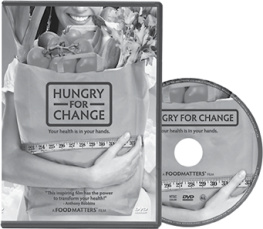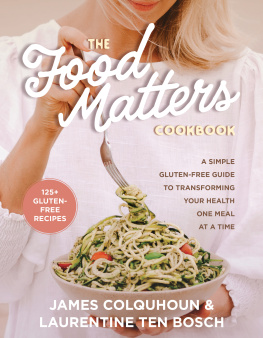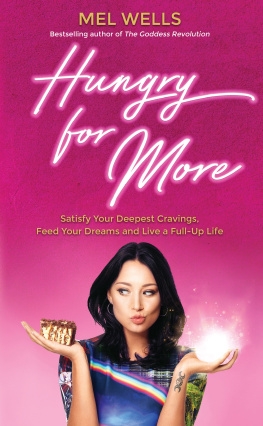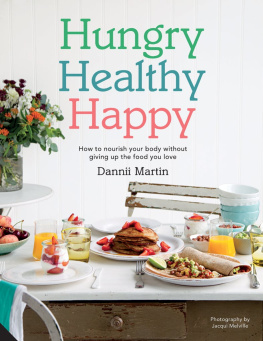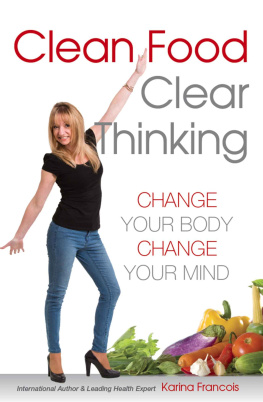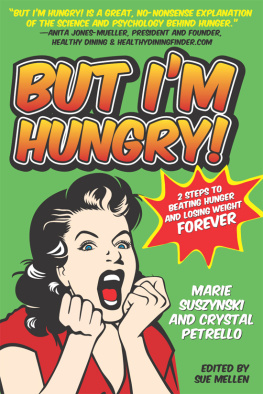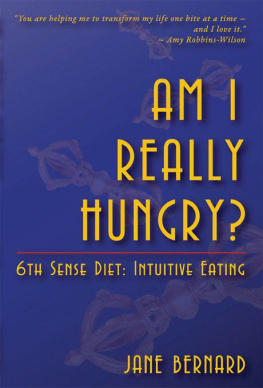
Publishers Note
To view this e-book in two colors on a color e-reader, please set Publisher Defaults to on.
This book is dedicated to that part within all of us that strives for perfect health, our innate birthright.
Contents
The Last Diet You Will Ever Need
W hy do we believe that we can feed our bodies manufactured, nutrient-depleted, food-like substances, empty of all life, and yet remain healthy? How did we come to believe that industrial chemicals and processing could replace what nature produces? A hundred years ago, all food was organic, local, seasonal, and fresh or naturally preserved by ancient methods. All food was food. Now, less than 3 percent of agricultural land in the United States is used to grow fruits and vegetables, which should make up 80 percent of our diets. Today, not even enough fruits and vegetables are grown in this country to allow all Americans to eat the five to nine servings a day set forth by the U.S. governments dietary guidelines.
What most of us are left with is industrial food. And who knows what lurks in the average boxed, packaged, or canned factory-made science project. When a French fry has more than 20 ingredients and almost all of them are not potatoes, when a fast food hamburger contains very little meat, and when the average teenager consumes 34 teaspoons of sugar each day, we are living in a food nightmare, a sci-fi horror show.
The very fact that we are having a national conversation about what we should eat, that we are struggling with how to define the best diet, is symptomatic of how far we have strayed from the natural conditions that gave rise to our species and from the simple act of eating real, whole, fresh food. When eating real food is a revolutionary act, we are in trouble.
The food industrywhich is the second-largest employer in the United States, after the federal government, and which heavily influences both the media and the government agencies that regulate it (the Department of Agriculture, the Food and Drug Administration, and Congress)intentionally confuses and confounds us. Low-fat is good, so anything with low-fat on the label must be healthy. But a soda is 100 percent fat-free, and that doesnt make it healthy. Now we are being told to eat more whole grains, so a few flecks of whole grains have been sprinkled on sugary cereals. That doesnt make them healthy either. The best advice is to avoid foods with health claims on their labels. Better yet, avoid foods with labels in the first place.
Our taste buds, our brain chemistry, our biochemistry, our hormones, and our kitchens have been hijacked by the food industry. The food-like substances proffered by the industrial food system trick our taste buds into momentary pleasure but not our biology, which reacts, rejects, and reviles the junk plied on our genes and our hormonal and biochemical pathways. We need to unjunk our biology.
Industrial processing has given rise to an array of addictive, fattening, metabolism-jamming chemicals and compounds, including MSG (monosodium glutamate), aspartame, high-fructose corn syrup, and trans fats, to name the biggest offenders. Researchers use MSG to study obesity. It is an excitotoxin that stimulates the brain into wanting to eat uncontrollably. When fed to laboratory mice, the mice pig out and get fat. MSG is in 80 percent of all processed foods, mostly disguised as a natural flavoring. Trans fats, another example, are derived from vegetable oils and then chemically altered to resist degradation by bacteria, which is why store-bought cookies can last on your pantry shelf for years. But the ancient energy system of our bodys cells is descended from bacteria, and those mitochondria cannot process trans fats. Our metabolism becomes blocked, and weight gain and type 2 diabetes ensue.
Our tongues can be fooled by and our brains can become addicted to the slick combinations of fat, sugar, and salt pumped into factory-made foods, but our biochemistry cannot, and the result is the disaster of obesity and chronic disease that we have in the United States today.
It is no wonder that 68 percent of Americans are overweight and that, since 1960, the obesity rate has risen from 13 percent to 36 percent and soon will reach 42 percent. Over the last decade, the rate of prediabetes or diabetes in teenagers has risen from 9 percent to 23 percent. Really? Almost one in four of our kids now has either prediabetes or type 2 diabetes. And 37 percent of the kids who are not considered overweight have one or more cardiovascular risk factors, such as high blood pressure, high cholesterol, or high blood sugar, because even though factory food hasnt yet made them fat, it is making them sick!
It is time to take our kitchens and our homes back. Transforming the food industry seems a monumental undertaking. But it is not. It is a small problem. It is in the small places of our lives: in our shopping carts, our fridges, our cupboards, our kitchens, and our dining rooms. This is where all of our power is. The hundreds of little choices we make every day can topple the monolithic food industry. The past century is littered with the remains of fallen despots and despotic regimes. From the fall of the Berlin Wall to the rise of the Arab Spring, there is no force more powerful than a small group of individuals with a desire to end injustice and abuse.
HUNGRY FOR CHANGE breaks through any confusion about what is in the food we eat today and plants the seeds of revolution with very simple ideas: Our bodies were designed to run on real food. Our natural state is health. We need to simplify our ways of eating. If we unjunk our diets and detoxify our bodies and minds, we heal. Simply choose real food: vegetables, fruits, nuts, seeds, healthy oils (olive, fish, avocado, and coconut), and small amounts of whole grains, beans, and lean animal proteins, including wild-caught fish, organic grass-fed meats, and organic free-range eggs.
In this book, there is no diet regimen, no calorie counting, and no measuring of fats, carbs, or protein grams. None of that matters if you choose real, whole, fresh, live foods. If you choose quality, the rest takes care of itself. When you eat empty industrial foods, with their addictive chemicals and sugars, your body craves more because it needs nutrients not found in dead foods. Yet after eating nutrient-dense fresh foods for a few days, you break the biological addiction to industrial foods. After a few more days, your cells begin to rejuvenate and your body heals from the inside out. And the side effects are all good ones: effortless weight loss; a reversal of high blood pressure, diabetes, and high cholesterol; a clearing of any foggy headedness; a lifting of depression and fatigue; and healthier skin, hair, and nails.
More important than what you take out of your diet is what you put into it. Add in the good stuff and there wont be room for the bad. Mother Nature is the best pharmacist, and real food is the most powerful drug on the planet. Real food works faster, better, and cheaper than any pharmaceutical. And when spiced up with a few superfoods, such as chia seeds, hemp seeds, parsley, cilantro, coconut, and green juices, a diet of whole real food can benefit thousands of genes, regulate dozens of hormones, and enhance the function of tens of thousands of protein networks. Dinner becomes your date with the doctor. What you put at the end of your fork is more powerful than anything you will ever find at the bottom of a prescription bottle.
HUNGRY FOR CHANGE offers us a simple road map to health. Real food, adequate sleep and physical movement, self-love rather than self-loathing, and holding on to a healthy image of yourselfsolutions to both our health crisis and our obesity epidemic are not complicated. Health and happiness are often just a few days away. Plus, by making small changes in our lives, each of us has the capacity to effect big changes in our food landscape, our agriculture system, and even government policies. I hope HUNGRY FOR CHANGE is the start of a true food revolution.
Next page
